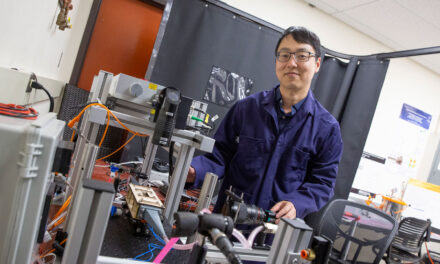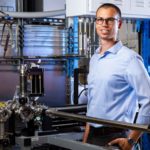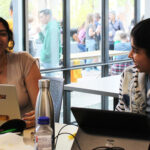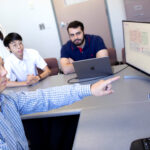
ASU students put astronautics lessons into action
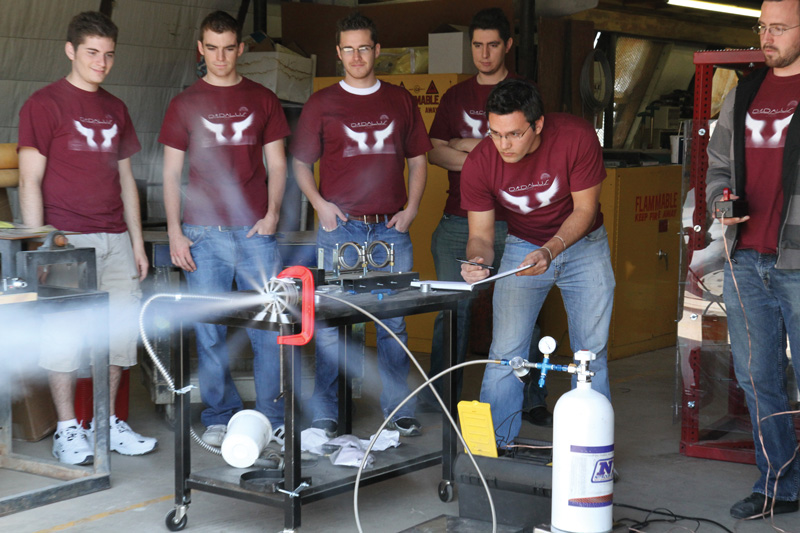
February 17, 2009
Rocket science is being taken to higher altitudes at Arizona State University by Daedalus Astronautics.
The rocket club members – about 35 ASU students, mostly engineering majors – are earning top regional and national rocketry awards against formidable competition. They are mentoring young students at elementary, middle and high schools in the basics of science, engineering and math. And they’re broadening opportunities for ASU students to get hands-on experience in technology design and development.
The club recently gained some major recognition when James Villarreal, who founded Daedalus Astronautics five years ago, won a top prize at the American Institute of Aeronautics and Astronautics (AIAA) Foundation International Student Conference, a leading national aerospace industry showcase held in January.
Villarreal, a Ph.D. student and graduate teaching associate in the Department of Mechanical and Aerospace Engineering, won first place at the Orlando, Fla., conference in the graduate division for his paper and presentation in a competition against six other regional graduate division winners from the United States and other countries.
The win adds to a string of successes for Daedalus members.
In a 2008 regional AIAA event against seasoned competitors from the University of Southern California, the University of California at Los Angeles, the University of Washington, San Jose State University and California State University-Long Beach, Daedalus members took first place in the team category for their research paper and a presentation before judges from Boeing and Honeywell corporations and the National Aeronautics and Space Administration.
ASU students also took home three top awards for individual graduate student research papers. First place went to Villarreal, second place to Chinmay Nath and third place to Javier Avalos, all graduate students in the Department of Mechanical and Aerospace Engineering.
Learning skills that ‘set us apart from our peers’
Thrilled by his own success at the January AIAA national conference in Florida, Villarreal says that “even more exciting [than the award] is the strong conference performance by our Daedalus rocketry club, specifically conference presenters Jacob Dennis, Steven Shark, and A. J. Colangelo. This is yet one more excellent example of the unparalleled experience that students gain through the hands-on design and manufacture of high-powered rockets.”
Daedalus Astronautics, says aerospace engineering senior Steven Shark, “has allowed me to gain experience in the application of engineering principles on real projects. It’s an unbelievable feeling to take a design as sketches on a piece of paper and turn it into a rocket launching into the sky, and then be able to present that design in front of aerospace professionals at conferences. Daedalus has truly allowed me to become a better engineer.”
Adds Jacob Dennis, a senior in aerospace engineering, “Daedalus Astronautics has provided me with an unparalleled opportunity to apply the knowledge that I have gained in classes in real-world situations. The competitions have tested our team’s engineering skills time and time again. Most of our members would have struggled to invent a solution to a real-world problem before getting involved in Daedalus. With the experience we have gained, we now have the tools necessary to design, build and verify a solution to any problem placed before us. This is a skill that sets us apart from the majority of our peers.”
Making students more attractive to future employers
Villarreal established Daedalus Astronautics with the help of a donation from Raytheon Corp., a major defense and aerospace company.
The club’s name came from a figure prominent in the mythology of ancient Greece. Daedalus, an inventor and skilled craftsman, constructed wings for his son Icarus to attempt an airborne escape from imprisonment on the island of Crete.
Daedalus Astronautics is working on more advanced technology.
“Our enduring goal is to design and build a progressively more complex family of high-powered suborbital rockets,” Villarreal says. “This is exactly the type of extracurricular activity that, when coupled with real hands-on work, augments a typical education and makes students more attractive for future employers.”
Daedalus members “don’t just buy rocket pieces and put them together, we build everything from scratch,” Villarreal says.“Compared to the hobby world, we play with some very expensive materials.”
Depending on the specific objective, Daedalus members select a motor size and build the necessary rocket structures from raw materials, such as fiberglass or carbon fiber.
Villarreal explains: “Next, we go to the lab and decide on a proper propellant formula or engine configuration. After that comes test firing of the motors to qualify them for launch. Building your own motors is not a thing that happens very often. Very few school rocket clubs attempt to do it themselves. They often rely solely on buying commercially available motors, and even fewer actually get their motors to work properly.
“Daedalus, on the other hand, has never had a custom motor failure during launch, and we are currently building more advanced forms of propulsion including hybrid motors and aerospike nozzles. A lot of additional work goes into electronics and various other logistics. After months of work, we travel to sanctioned launches or competitions – usually in the middle of the desert – cross our fingers and fire the ignition charges.”
Sparking passion about science and engineering
Club members currently are gearing up for more opportunities to showcase their rocketry skills at competitions around the United States, including the Experimental Sounding Rocket Association Intercollegiate Rocketry Competition and the NASA University Student Launch Initiative later this year.
Daedalus members will also be returning to the AIAA Region VI conference in March, where they will present their new work on hybrid motors and aerospike nozzle technologies.
In addition to competitions and research papers, club members also participate in community outreach efforts to promote interest in science, engineering and math among younger students.
Daedalus members have conducted workshops to teach the fundamentals of rocketry and help them build and launch rudimentary rockets.
In the past five years, Daedalus has brought rocketry instruction to more than 800 elementary, middle and high school students throughout the Phoenix metropolitan area, helping these students build their own small model rockets.In addition, thousands of other students have seen Daedalus members present on launch exhibitions at their schools.
“Our outreach efforts are geared to promote a passion for scientific exploration in young students,” says Kelly Mahon, an aerospace engineering graduate student and one of six female members of Daedalus. “We take students through the whole process from initial design calculations to launching model rocket. At our workshops they see how exciting science and math can be beyond the tedium of reading textbooks and doing homework assignments.”
The club’s efforts have been promising enough to attract funding from Orbital Sciences Corp., as well as from NASA and ASU’s Ira A. Fulton School of Engineering.
Through the club’s continuing relationship with Raytheon Corp., five members will be doing internships with Raytheon this summer and the company recently awarded a fellowship to one club member to help him complete graduate studies.



